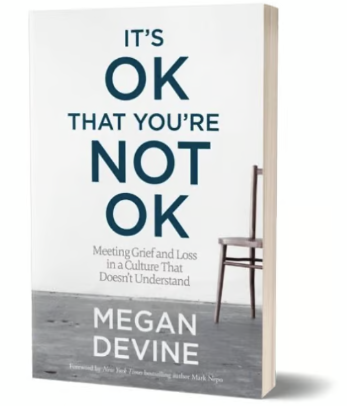BOOK RECOMMENDATION: It’s OK That You’re Not OK
Title: It’s OK That You’re Not OK: Meeting Grief and Loss in a Culture That Doesn’t Understand
Author: Megan Devine
Year: 2017
Tags: Grief, Loss, Adults
Trigger Warning: While it may be obvious by the title, this book is focused on the topic of grief and loss. The author, Megan Devine, shares a personal anecdote in the early pages regarding her motivations for writing this book, which although done with care, could be triggering or heavy for some. Devine speaks of a tragic and sudden loss she experienced in her life; the drowning event of her late husband. She also utilizes personal stories of “grief students”, some of which can be emotional and raw.
The author also speaks of suicidal thoughts and ideation in chapter 8, the chapter is titled “How (and why) to stay alive” (p. 117-132, Devine) – namely focusing on how suicidal thoughts can be a normal experience for someone in the throes of grief, and how there are many resources and supports available to you, as the griever, should you be experiencing these thoughts yourself.
As always, if any of the content is too heavy and/or leaving you feeling worse, we recommend either skipping over, or putting the book down and coming back at a later time when you feel is better for you.
If you’re in crisis and need immediate support in Ontario, Canada, remember we have 24/7 crisis services at 9-8-8 (text or call), or by calling 9-1-1 if you’re in immediate danger.
What’s It About?
Megan Devine has crafted a true masterpiece out of this read. Tackling the topic of grief and loss in such a relatable and validating way is no easy feat. Devine offered readers a book that blends a beautiful mix of psychoeducation and theory, with practical tips and exercises for navigating grief and loss. This book is especially ideal for anyone battling the Western cultures take on grief and loss (currently viewing grief as a problem to be “fixed” rather than a natural, normal human experience). Devine illustrates why our current dominant models of grief don’t work, and how reframing our understanding of grief and loss would create an important shift in how our society tends to and experiences grief and loss.
Devine breaks the book into four parts – starting with theory and understanding grief in part one (Part I: This is all just as crazy as you think it is), moving to tips and exercises for the griever in part two (Part II: What to do with your grief). Part three (Part III: When friends and family don’t know what to do) is designed for friends and family members looking to help a loved one who is currently experiencing grief and loss. And lastly, part four (Part IV: The way forward) rounds out the read with some words of wisdom and hope, and a path forward. It’s important to note that while you can consume the read from start to finish in linear fashion, you can also pick and choose which chapters you’d like to read and in what order, and still come away with a plethora of knowledge and understanding about grief and loss in our society.

Highlights:
Truthfully, finding just one area to highlight was such a hard task following this read! There are so many relatable, and incredibly important, aspects of this read that deserve their moment to shine. So, we decided to pick a couple (but want you to know there’s so much more – we couldn’t fit it all in this one blog post).
(1) Chapter 7: You can’t solve grief, but you don’t have to suffer
“The way to live inside of grief is not by removing pain, but by doing what we can do to reduce suffering” (pg. 85, Devine).
Devine spends significant time explaining the difference between pain and suffering, and notes that while pain is a natural, normal and essential part of grief (not to be fixed), we can tend to our suffering and reduce any exacerbated suffering while we move through and live in grief (Devine, 2017).
In chapter 7, Devine invites readers to complete the “Wellness Versus Worseness” exercise (page 98, Devine). The exercise encourages readers to document on one side of the page things that exacerbate their grief and suffering (worseness), and on the other side capture what reduces suffering (wellness). The author also encourages readers to complete this exercise in a time of calm, as it can act as a grounding reminder in times great suffering, and help give you insight into what may help move you closer to wellness (Devine, 2017).
(2) Chapter 9: What happened to my mind? Dealing with griefs physical side effects …
“We often think of grief as primarily emotional, but grief is a full-body, full-mind experience” (Devine, page 117).
In this chapter, Devine marvellously tackles the topic of grief and your physical and mental experience. Of particular interest, on pages 123-130, Devine covers the cognitive impairments related to a grief experience. She discusses phenomenon such as “widowed brain”, a term to describe the “cumulative cognitive effects of grief”. Devine covers topics such as memory loss, mental exhaustion, confusion, and more, depicting how and why grief can put these once well functioning cognitive processes through the wringer.
Caveats:
As you could have guessed, we are big fans of this read! But if we were to give any caveats it would be these:
- As with other book recommendations, it’s important to note that the author is a practicing clinician in America. Therefore, some of her recommendations or reference to legislation may be specific for American citizens and less relevant to those living in other countries, such as Canada. We only truly noted this in relation to crisis resources shared, but want readers to be aware that psychotherapy is a protected act and is governed by different regulatory bodies across countries and provinces/states.
- This is not a spiritual book (not even in the slightest). While often times we couple grief and loss with spiritual beliefs and practices, Devine intentionally works to step outside of that narrative. There is a small section under a heading titled “What about God?” on pages 43-44. Additionally, throughout the book Devine often references common phrases we hear in our society, such as “this happened for a reason”, and “there is a greater plan”, and combats why these believes and attempts at condolence can be problematic and harmful to a person in grief. This is not to diminish spirituality or religious beliefs of any kind, it’s just not the topic of this particular read.
- While this book is filled with takeaways for any grieving person (whether you’re 10 years out from a loss or it just happened yesterday), we suspect this book would be most appropriate for someone who’s experienced a sudden and/or unexpected loss (specific to death and dying). A lot of the excerpts pulled from student writings reference losses such as parents who have lost children or infants, spouses who lost their life partner suddenly and unexpectedly, siblings losing a sibling. Again, many exercises are generalizable to many types of grief, but likely the ones who will connect most will be those who have a grief experience related to those unexpected/unnatural death and dying events.
Extra Resource:
To learn more about Devine, her books, podcast, and so much more, check out her website here: https://refugeingrief.com/
Rating:

FOOTNOTE CITATION: Devine, M. (2017). It’s OK that you’re not ok, meeting grief and loss in a culture that doesn’t understand. Sounds True Publication. Boulder, Colorado.



